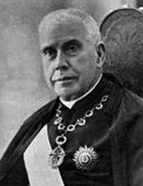

This addiction to “truth” and documental accuracy begins with a criticism and the exact publication of the document, without falsification or errors. His scruples in this matter were clearly recorded in the volume Dr. Francisco Suárez, doctor eximius (1897), a work that consists of a large number of documents preceded by a long prologue of a biographical nature. This was requested after he had presented the compilation of documents that had been commissioned by the Council of Theology to commemorate the third centenary of Suárez’ incorporation into the University, a ceremony that had in fact been proposed by Vasconcelos himself. In effect, as all the documents in the work were transcribed by his own hand, at the end of the work he drafted a certificate of responsibility together with the Secretary of the University after they had jointly checked the printer’s proofs to ensure “their perfect accuracy”. Later, Mário Brandão considered this work to be a milestone for the study of the history of the University, giving continuity to the work already undertaken in the first half of the 18th century by F. C. de Figueiroa, “the worthiest of all João Pinto Ribeiro’s precursors” (“Biografia”, 1948, p. 40).
The nature of the 1897 study and the responsibility assumed before the international scientific community could justify António Vasconcelos’ precautionary measure. However, the notion of certified accuracy was a part of him. In effect, on publishing the two oldest documents in the University Archive, dating from 1030 and 1090, of great importance to philologists, António Vasconcelos, as Director of the Archive, wrote that the documents “were scrupulously checked against the respective originals and their perfect accuracy was verified”. This was a standard of meticulousness that he passed on to his disciples, together with another principle enshrined in how science was validated: the accurate indication of the source so the reader could verify it, as he wrote in the prologue to Brás Garcia Mascarenhas.
António Vasconcelos was always considered by his colleagues as a meticulous discoverer of facts with an obsessive eye for detail, in the words of Torquato Soares or in the similar critical appreciation of Manuel Gonçalves Cerejeira or Eugénio de Castro. Already in 1912, at a session of the University Senate, his “spirit, long proficient and secure in the field of historical research” had been recognised. And in 1927, at the time when he was preparing the first edition of Inês de Castro, he informed the Lisbon Academy of Sciences through his friend José Maria Rodrigues of the exact location where Inês de Castro had been decapitated and “where the final period of the lovers had been spent”. As he said, “years of searching in archives and investigating in situ put me in a position whereby I could specify the location, and say, in all security: It was here”. (António de Vasconcelos, 2000, p. 152).
